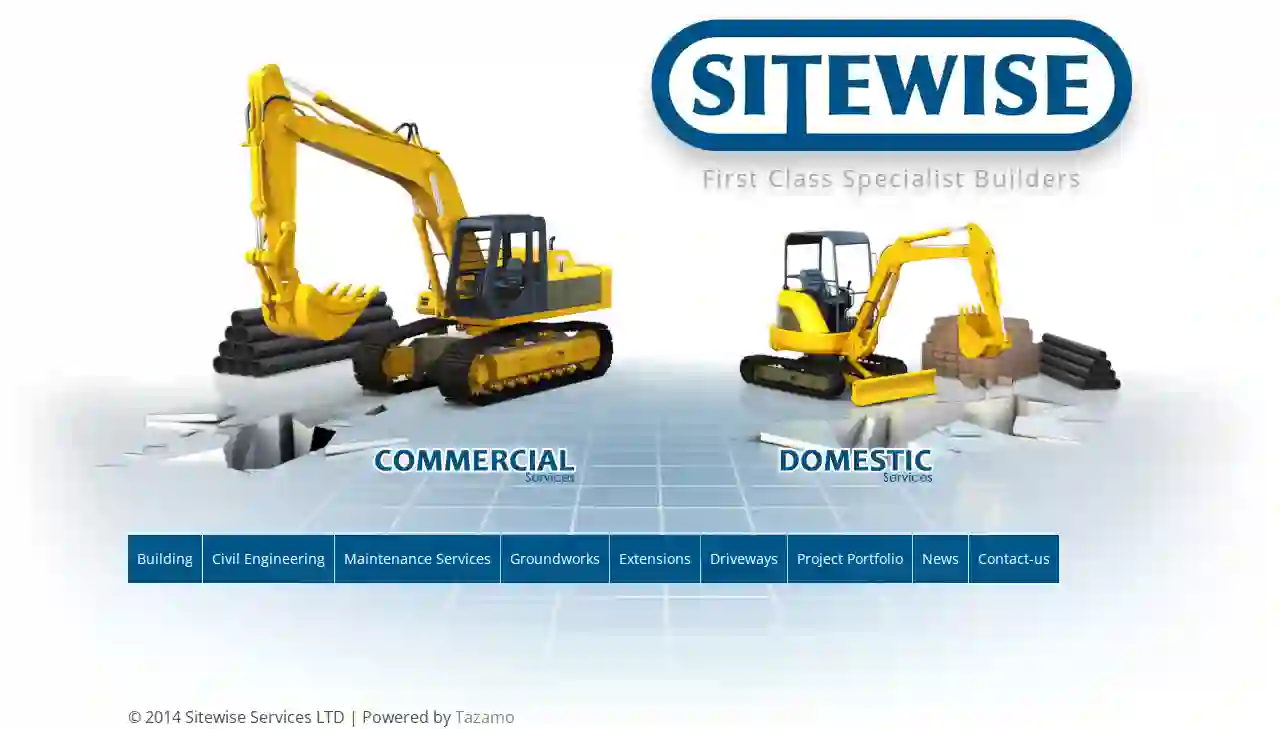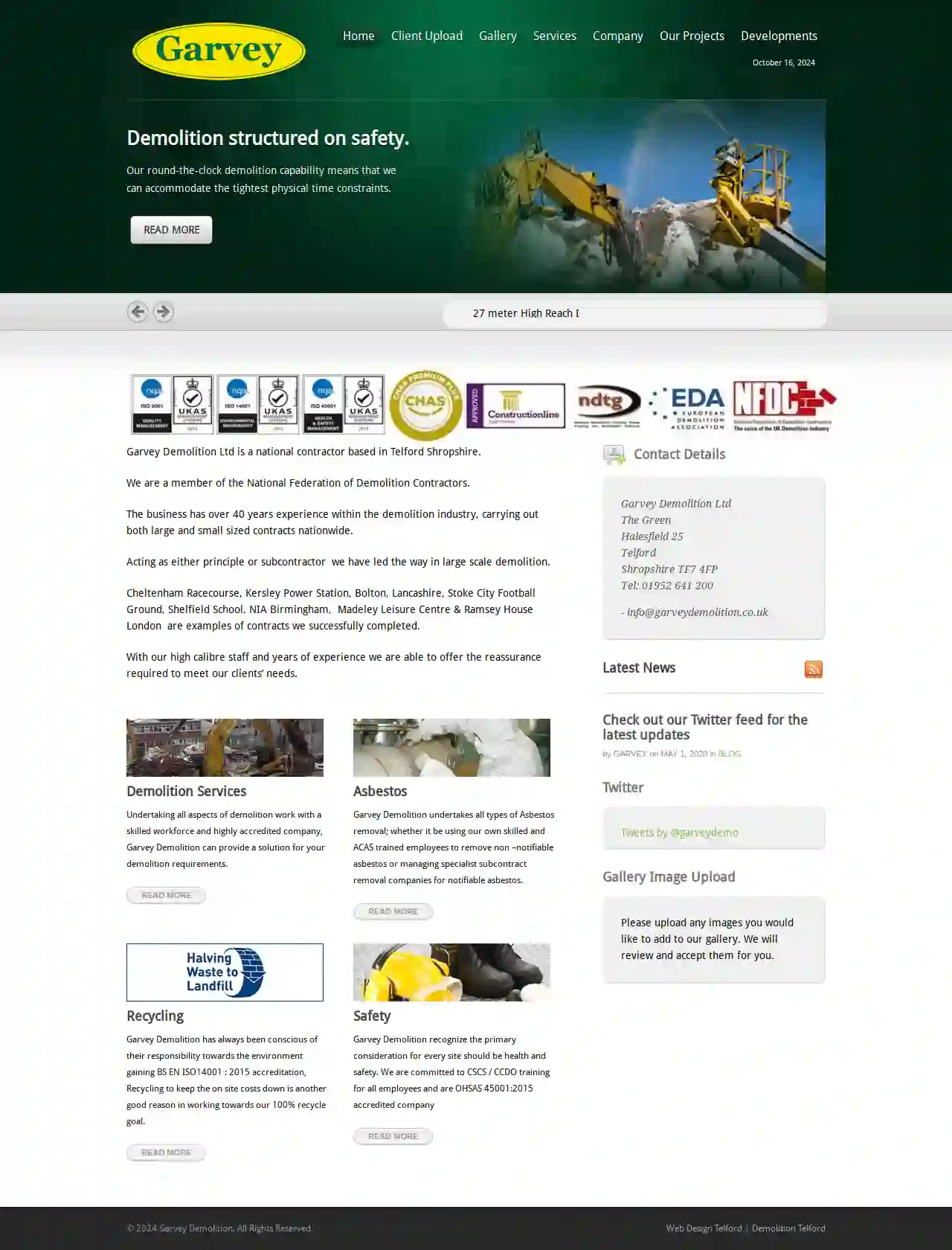Excavation Contractors Madeley
Top Excavation Contractors Near Me in Madeley
Get up to 3 Excavation Contractors quotes for your project today! Compare profiles, reviews, accreditations, portfolio, etc... and choose the best service.

Wrekin Drain Services Ltd
4.828 reviewsTelford, GBAbout Wrekin Drain Services Wrekin Drain Services is a fully accredited professional drainage company that has been providing top-notch solutions since 2005. We are your local, fast-response drainage team, offering free quotes, competitive prices, and unbeatable service throughout Telford, Shrewsbury, Shropshire, and surrounding areas. Our team is DBS checked and holds all relevant certifications to perform all types of drainage work. We are committed to providing our clients with the highest quality service and are proud to have a long list of satisfied customers. Some of our key accounts include Telford & Wrekin Council, Shropshire Council, and Harper Adams University. We are dedicated to maintaining industry-leading accreditation, demonstrating our expertise and commitment to excellence. Our team is highly skilled and experienced in all aspects of drainage, from simple drain unblocking to complex sewer repairs. We use the latest technology and equipment to ensure that all our work is carried out to the highest standards. We are available 24 hours a day, 7 days a week for emergency callouts. We understand that drainage problems can be stressful and disruptive, so we aim to respond quickly and efficiently to minimize any inconvenience. Contact us today for a free quote or to discuss your drainage needs.
- Services
- Why Us?
- Testimonials
- Gallery
Get Quote
Metro Rod (Shropshire)
4.822 reviewsAshwood Court, Tytherington Business Park, Macclesfield, Cheshire, SK10 2XF, GBMetro Rod Mid Wales & Shropshire Local, trusted drainage engineers available for all drain repair, drain unblocking, septic tank, and pump issues. Metro Rod-Mid Wales & Shropshire has you covered. Contact us today for a quote and free site-assessment. Services in Mid Wales & Shropshire We offer a wide range of drainage services to both domestic and commercial customers in Mid Wales & Shropshire. Our team of experienced engineers are available 24/7 to help with any drainage problem, no matter how big or small. Our Services Include: Drain care & repair Tanker services Pump maintenance Septic tanks and sewage treatment plants Why Choose Metro Rod Mid Wales & Shropshire? 24/7 emergency service Free site assessments Competitive prices Experienced and qualified engineers Excellent customer service
- Services
- Why Us?
- Gallery
Get Quote
One Source Construction Services
54 reviews17 Foresters Close, Horsehay, Telford, Shropshire, TF4 3BW, GBAbout Us One Source construction Services are based in Telford, We cover works within the Midlands area. Our projects include both new construction, repairs/restorations across all areas of the industry. Occupied and fully operational job sites are never a problem. Also, we can plan, manage, and build multi-phase jobs. At One Source Construction Services we aim to be a one stop shop where we take all the stress of organising your project so you don`t have to. Working Together We offer an end-to-end client experience that includes; seamless communication, budgeting, staffing, on-site organisation, and solid, quality handy-work every time. Why Choose Us? We carry out all aspects of construction works projects, big or small. Call us today and bring our project management skills and extensive construction experience to your next project.
- Services
- Why Us?
- Gallery
Get Quote
owens plant & machinery ltd
Ironbridge, Telford, GBWelcome to Owens Plant Machinery Limited We are a family run company which all started back in 1968 when Mr Henry Owen purchased his first digger and has steadily grown into the friendly, reliable company as it is now. We offer operated and non-operated self-drive plant hire. We cater for the general public as well as national companies. We are here to help and we endeavour to do our utmost to help.
- Services
- Why Us?
- Testimonials
- Gallery
Get Quote
MSR Building Ltd
57 reviews20 Hollybush Road, Telford, Tf7 5hs, GBWELCOME TO MSR BUILDING LTD A family run business with numerous years in the construction industry. Specialising in Building and Landscaping. MSR Building Ltd is a Shropshire based Building company serving Telford and surrounding areas. With over 15 years in the Building and Construction industry…. MSR Building Ltd are always happy to support our customers in their every need and go that extra mile to make sure the customer is happy with the outcome of there project big or small…Specialising in Extensions and Landscaping we strive to give great quality work whatever the project.
- Services
- Why Us?
- Gallery
Get Quote
Sitewise Services (Wellington) Ltd
51 reviews65 Sheriffhales, Shifnal, 65 Sheriffhales Shifnal Shropshire, TF11 8RQ, GBAbout Sitewise Services Sitewise Services is a reputable building and civil engineering company based in Shropshire, UK. We specialize in a wide range of services, including groundworks, extensions, driveways, and maintenance. Our team of experienced professionals is dedicated to delivering high-quality workmanship and exceeding client expectations. We pride ourselves on our commitment to customer satisfaction and our ability to complete projects on time and within budget.
- Services
- Why Us?
- Gallery
Get Quote
Rosehill Contractors Ltd
511 reviewsMarket Drayton, Shropshire, UK., GBWelcome to Rosehill Contractors Limited We are a construction company based in Market Drayton, Shropshire, dedicated to delivering high-quality projects. With a team of experienced professionals, we provide comprehensive services to meet all your construction needs, big or small. New Builds Projects Got a plot of land and you're looking to build something bespoke? Our new build service offers a complete turn key solution. From design to construction, working with you to ensure your vision and dreams become a reality. We handle every aspect of the project with precision and care. Landscaping and Utilities Whether it's a residential or commercial site, our team has the expertise to get the job done quickly and efficiently. We focus on quality, house-keeping and repeat custom. Footings, drainage and earthworks If it's simply the footings and drainage work you need installing, we're always happy to help. Working alongside engineers via GPS points we can mark out and dig footings within an hour or so of being on site. Why choose us? Whether it's a complete new build package, a small extension or simply a new patio and some landscaping that you're after, you can put maximum trust in us to deliver top quality craftsmanship, on a realistic budget, in the tidiest, most efficent way. Contact us Get in touch with us today and let's discuss how we can bring your construction project and ideas to life. About us At Rosehill Contractors Limited, we take pride in our commitment to excellence, integrity, and customer
- Services
- Why Us?
- Gallery
Get Quote
Richards Plant Hire
51 reviewsWestcott, Westcott Lane, Goldstone Shropshire, Goldstone, TF9 2ED, GBWELCOME TO RICHARDS PLANT HIRE Adaptable, friendly & professional We’re a small family Plant Hire business run by David and Jayne Richards, with the capacity to take on any job around the UK. Using our own plant machinery allows us to deliver results quickly whilst keeping costs down, making us very popular with customers that range from commercial premises, industrial, farms and rural estates. ADAPTABLE, FRIENDLY & PROFESSIONAL With over 15 years’ experience and a background in the farming industry, we know exactly how to adapt our machinery to any kind of site. Our portfolio has seen us work at rural premises of all shapes and sizes, excavating for shed bases, new buildings and many other developments. We also work with industrial and commercial customers, easily adapting to remote locations and bustling centres of trade alike. With the flexibility to deliver anything from a one-day job to a long-term contract, we provide the peace of mind that no task is too big or small, all at a lower cost per tonne. SPECIALISTS IN CONCRETE CRUSHING: We can work on any commercial, rural or residential site. PREMIUM CUSTOMER SERVICE: We’re committed to safety, reliability and satisfaction. A SPECIALIST FLEET OF MACHINERY We have the right equipment for any kind of project, including: Concrete crusher Excavators Dumpers Dozers Low-loader Specialised attachments for excavators Our excavators are fitted to adapt specialized equipment to cover a range of activities. Our operators are experienced, competent, hold recognised qualifications and we are fully insured. GET IN TOUCH: We’re always ready to have a friendly discussion about your needs and offer a free quotation. Simply email [email protected] or call 01630 661352. Alternatively, call David on 07801 563551
- Services
- Why Us?
- Our Team
- Gallery
Get Quote
Garvey Demolition
The Green, Halesfield 25, The Green Halesfield 25 Telford Shropshire, Telford, TF7 4FP, GBDemolition structured on safety. Garvey Demolition’s specialist skills and equipment mean that you can have confidence in our ability to complete even the most difficult demolition jobs. Demolition structured on safety. Our round-the-clock demolition capability means that we can accommodate the tightest physical time constraints. Demolition structured on safety. Garvey Demolition’s specialist skills and equipment mean that you can have confidence in our ability to complete even the most difficult demolition jobs. Garvey Demolition Ltd is a national contractor based in Telford Shropshire. We are a member of the National Federation of Demolition Contractors. The business has over 40 years experience within the demolition industry, carrying out both large and small sized contracts nationwide. Acting as either principle or subcontractor we have led the way in large scale demolition. Cheltenham Racecourse, Kersley Power Station, Bolton, Lancashire, Stoke City Football Ground, Shelfield School, NIA Birmingham, Madeley Leisure Centre & Ramsey House London are examples of contracts we successfully completed. With our high calibre staff and years of experience we are able to offer the reassurance required to meet our clients’ needs.
- Services
- Why Us?
- Accreditations
- Gallery
Get Quote
Best Driveways TKL Properties maintenance LTD
516 reviews123 Main Street, City, XX1 1XX, GBAbout Best Driveway Best Driveway is a leading provider of driveway services in the UK. We offer a wide range of services to meet your needs, from simple repairs to complete driveways. We are committed to providing our customers with the highest quality workmanship and customer service. We are fully insured and accredited, so you can rest assured that your project is in safe hands. We use only the best materials and techniques to ensure that your driveway is durable and long-lasting. We also offer a wide range of design options to suit your taste and budget. We are confident that you will be happy with the results. Contact us today for a free quote.
- Services
- Why Us?
- Accreditations
- Testimonials
Get Quote
Over 13,059+ Excavation Businesses on our directory
Our excavation companies operate in Madeley & beyond!
ExcavationHQ has curated and vetted Top Excavation Pros near Madeley. Find a trustworthy contractor today.
Frequently Asked Questions About Excavation Contractors
- Mechanical Excavation: Utilizing heavy equipment like excavators, backhoes, bulldozers, and loaders, suitable for most projects.
- Hand Excavation: Using hand tools (shovels, picks) for smaller excavations or delicate work near utilities.
- Blasting: Employing explosives to break up rock or hard materials, typically for large-scale projects.
- Hydro Excavation: Using high-pressure water jets to loosen and remove soil, often used for locating utilities or delicate excavation.
- Vacuum Excavation: Employing a vacuum system to suck up excavated material, suitable for safe excavation near utilities or in confined spaces.
- Project Size and Scope: The larger and more complex the excavation, the higher the cost.
- Soil Type: Different soil types require different equipment and techniques, impacting costs. Rocky or clay-rich soil can be more expensive to excavate than loose soil.
- Accessibility: Difficult-to-access sites might require specialized equipment or additional labor, increasing expenses.
- Disposal Costs: Hauling away excavated material (soil, rocks, etc.) to disposal sites incurs additional fees.
- Permits and Inspections: Depending on local regulations, permits and inspections might be required, adding to the overall cost.
- Hauling to Designated Disposal Sites: Transporting excavated material to approved landfills or recycling centers.
- Recycling or Reuse: If suitable, some excavated soil might be recycled for other projects or reused on-site for landscaping or backfilling.
- Complying with Regulations: Adhering to local and environmental regulations for soil disposal to prevent contamination or illegal dumping.
- Clear the Area: Remove any obstacles, including vehicles, outdoor furniture, landscaping features, or structures, from the excavation zone and surrounding area.
- Mark Existing Features: Identify and mark underground utilities, septic tanks, sprinkler systems, or other buried elements you want to protect.
- Protect Landscaping: Use tarps or fencing to shield trees, shrubs, gardens, or other landscaping elements from damage.
- Provide Access: Ensure the excavation contractor has clear access to the work area, including gates wide enough for equipment.
- Discuss Logistics: Coordinate with the contractor regarding parking arrangements, material delivery, and any special instructions or concerns you might have.
What are the different methods of excavation?
How much does excavation cost?
How do you handle soil disposal after excavation?
How do I prepare my property for excavation?
What are the different methods of excavation?
- Mechanical Excavation: Utilizing heavy equipment like excavators, backhoes, bulldozers, and loaders, suitable for most projects.
- Hand Excavation: Using hand tools (shovels, picks) for smaller excavations or delicate work near utilities.
- Blasting: Employing explosives to break up rock or hard materials, typically for large-scale projects.
- Hydro Excavation: Using high-pressure water jets to loosen and remove soil, often used for locating utilities or delicate excavation.
- Vacuum Excavation: Employing a vacuum system to suck up excavated material, suitable for safe excavation near utilities or in confined spaces.
How much does excavation cost?
- Project Size and Scope: The larger and more complex the excavation, the higher the cost.
- Soil Type: Different soil types require different equipment and techniques, impacting costs. Rocky or clay-rich soil can be more expensive to excavate than loose soil.
- Accessibility: Difficult-to-access sites might require specialized equipment or additional labor, increasing expenses.
- Disposal Costs: Hauling away excavated material (soil, rocks, etc.) to disposal sites incurs additional fees.
- Permits and Inspections: Depending on local regulations, permits and inspections might be required, adding to the overall cost.
How do you handle soil disposal after excavation?
- Hauling to Designated Disposal Sites: Transporting excavated material to approved landfills or recycling centers.
- Recycling or Reuse: If suitable, some excavated soil might be recycled for other projects or reused on-site for landscaping or backfilling.
- Complying with Regulations: Adhering to local and environmental regulations for soil disposal to prevent contamination or illegal dumping.
How do I prepare my property for excavation?
- Clear the Area: Remove any obstacles, including vehicles, outdoor furniture, landscaping features, or structures, from the excavation zone and surrounding area.
- Mark Existing Features: Identify and mark underground utilities, septic tanks, sprinkler systems, or other buried elements you want to protect.
- Protect Landscaping: Use tarps or fencing to shield trees, shrubs, gardens, or other landscaping elements from damage.
- Provide Access: Ensure the excavation contractor has clear access to the work area, including gates wide enough for equipment.
- Discuss Logistics: Coordinate with the contractor regarding parking arrangements, material delivery, and any special instructions or concerns you might have.